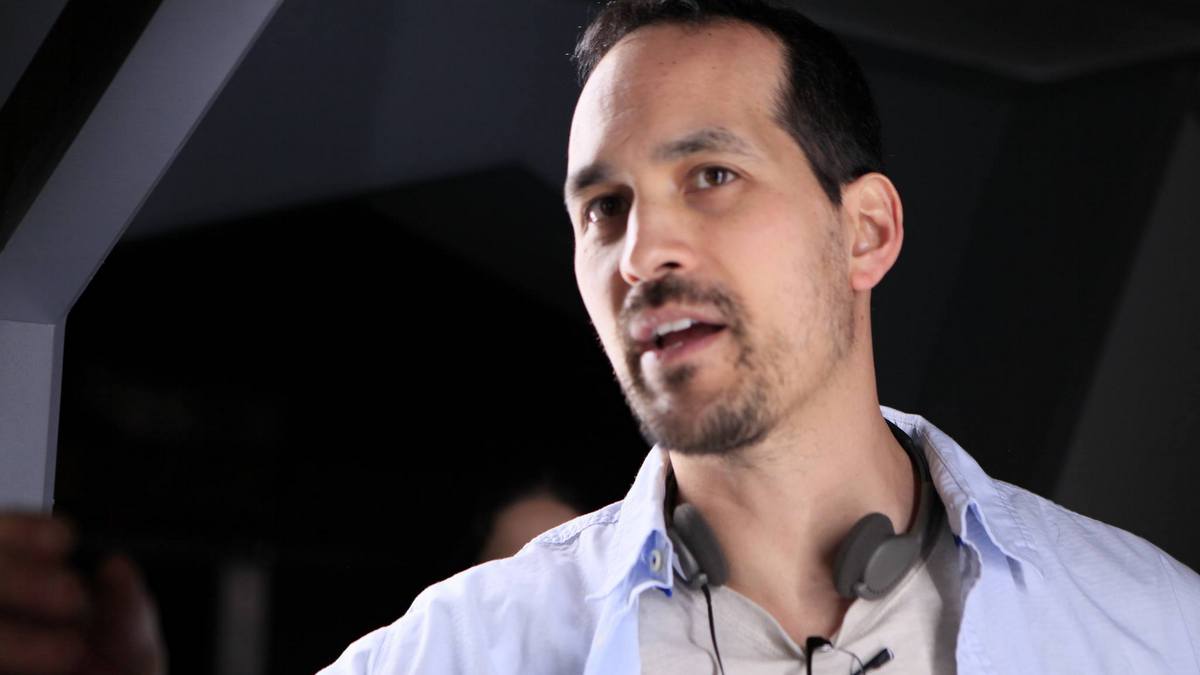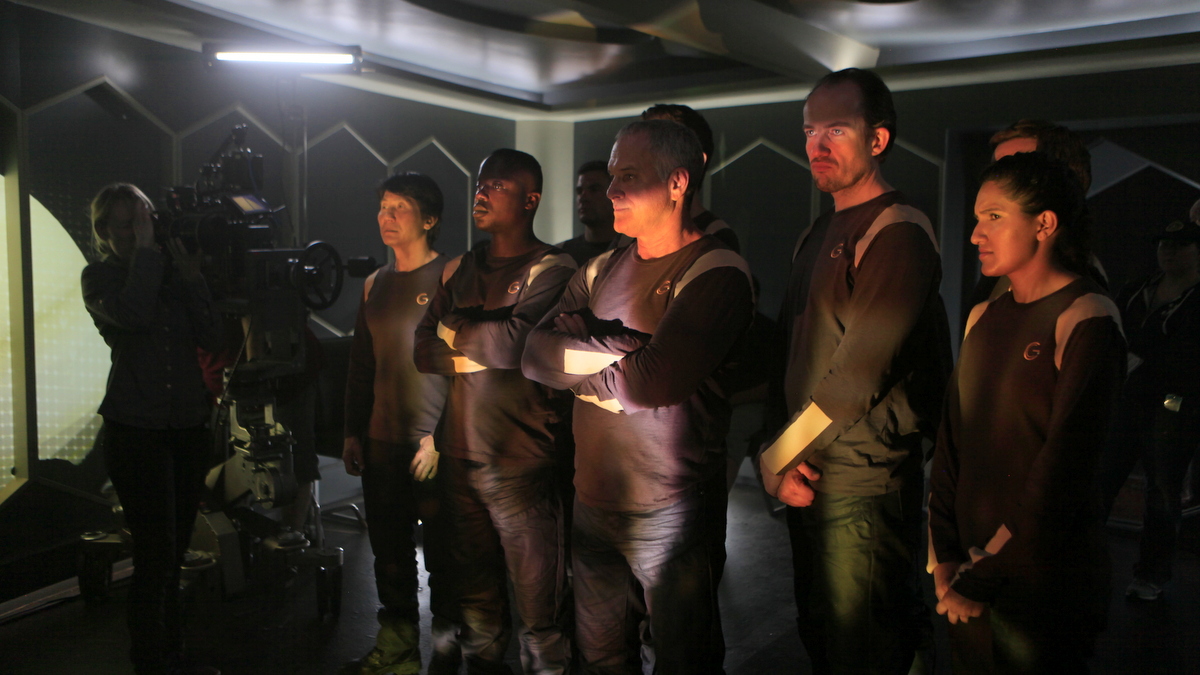
Beyond the Trek (formerly Teleios), a Sci-Fi mystery/thriller. The premise is: a rescue crew is sent into deep space to find if there are any survivors aboard a mining vessel whose crew mysteriously vanished. It’s won numerous awards, including the Forrest J Ackerman Imagi-movie award at Famous Monsters, Best Picture at the New York Science Fiction Film Festival and Best Picture at the Los Angeles Movie Awards.
indieactivity: Give a background of your personal experience with the story, writing, production and marketing
Ian: The plot of Beyond the Trek is based on the first screenplay I ever wrote back in college, but the unique twists came from separate articles I read in 2013 about space travel and human genetic modification. One article was about the primary problem with long-term space travel is the psychological and physiological effects on the human body. The second article was about how scientists are conducting tests to alter human’s en vitro, with the expected result of the first crop of elevated IQ ‘superbrain’ babies being born in or around 2020. If they can make babies smarter, they could also make them better fit for long term space travel. I mean, messing with human DNA, what could possibly go wrong?
indieactivity: Did you start writing with a cast (You or any) in mind?
Ian: Just one of the characters was pre-cast, Weetus Cren, who plays the role of Travis O’Neill (for which he’s won multiple awards). Weetus is a long time collaborator. The rest were cast after the script was finished.
indieactivity: How long did you take to complete the script? (Do you have a writing process?)
Ian: A few months and multiple drafts. I do a lot of research before I start writing, and on Beyond the Trek I had a lot of people give feedback various drafts of the script.
indieactivity: How did you develop ‘your film’?
Ian: Beyond the Trek was intended to be a commercially viable film that appealed to Sci-Fi audiences, but at the independent level. It’s very difficult to get new concept done at big studios that are more interested in producing lower-risk derivative work. Beyond the Trek is inspired more by the classics, like Blade Runner, 2001 and original Star Trek series than more recent Sci-Fi. I prefer the days when spectacle and special effects were enhancements to a good story, rather than as a crutch just to keep your attention.

indieactivity: How was it financed?
Ian: We were fortunate to have money lined up in advance, and a soundstage owned by the production company. It wasn’t a big budget, or a very big soundstage, so we did the best we could within our means.
indieactivity: Is there anything about the independent filmmaking business you still struggle with?
Ian: The economics aren’t favorable for filmmakers these days. It’s a combination of being able to make content cheaply creating a glut of product, and platforms offering big libraries of content through subscription services which lowers the overall perceived value of content in general. And piracy. It’s great for viewers to have a lot of options, but independent filmmakers are getting hosed.
indieactivity: How long was your pre-production?
Ian: About three months.
indieactivity: What was your rehearsal process and period?
Ian: We had one read-through with all the key cast members, and regularly rehearsed on set before shooting. Blocking was a challenge to rehearse, because often sets wouldn’t be finished until shortly before we started shooting.
indieactivity: You shot the film in days. How long were your days?
Ian: 16 days! I believe the longest day was 16 hours.
indieactivity: Did the tight shooting schedule make it harder or easier? How did it affect performances?
Ian: It was a challenge. I’m not sure if we would have ended up with a better product with more time, but we likely would have had more options. The cast were always prepared, so it didn’t affect the performances.
indieactivity: How much did you go over budget? How did you manage it?
Ian: We started out with a $650K budget and it kept growing. By the time we started shooting the budget was about $850K. Final was closer to a $1M. We ran out of money before post, so there was a delay in completing the film. Since we were doing a Sci-Fi and everything had to be made from scratch, including sets, costumes, props, etc., it was a challenge to keep the budget down, but we managed to pull it off.

indieactivity: How important is marketing? Do you think a project can make any dent without it these days?
Ian: Our marketing was through film festivals, social media and word of mouth. Big studios have the benefit of carpet bomb style advertising that require a huge budget, which indies don’t have. Getting recognized by festivals certainly helped get the word out.
indieactivity: What was the experience like of working with such a small shooting crew?
Ian: Since our soundstage was small it didn’t feel like a small crew, but by most standards it was! Honestly we couldn’t have crammed one more person in that space without breaking fire codes. What was good about that was there were no extraneous people, so if something had to be done no one waited for someone else to do it. It was a great team effort.
indieactivity: The film looks stunning. How did you get such a good look when shooting so fast?
Ian: Thank you, we’re very proud of the look. How we achieved that was with a lot of prep time and some awesome people in conceptual and production design crew. Kudos to Chuck Parker and his team.
indieactivity: Did you look at rushes? On what format?
Ian: Because of our rapid pace I didn’t get a chance to review the footage until after we finished shooting. Then I sat down with our editor Gabriella Cristiani and watched all the footage over the course of a week.
indieactivity: What were the advantages and disadvantages in the way you worked?
Ian: Making a movie is like trying to get a boulder to the other side of the mountain. It’s really hard to push it uphill (creating the right script, getting financing, finding the right people to come on board), then after it gets to the top it starts rolling faster and faster on its own (production), and you’re just holding on for dear life. Then you have to go back and clean up the path of destruction it left behind (post-production). There’s never a right or wrong way as long as you managed to pull it off. So many films never even get halfway up the mountain.
indieactivity: What else have you got in the works?
Ian: I’ve shifted from imaginary tech to real tech, and started a tech company called RANDIAN. You’ll be hearing more about that down the road I suspect.

Richard Green Documentary, ‘I Know Catherine, The Log Lady’: Premiere in NYC, LA May 9th
Lynchian Doc I Know Catherine, The Log Lady Makes Hollywood Premiere 4/17, Rollout to Follow
In Camera by Naqqash Khlalid Launch on VOD April 29
Naqqash Khlalid’s Directs Nabhan Rizwan. In Camera stars an EE BAFTA Rising Star Award Nominee.
2025 Philip K. Dick Sci-Fi Film Festival Award Winners Announced
Vanessa Ly’s Memories of the Future Awarded Best PKD Feature
Dreaming of You by Jack McCafferty Debuts VOD & DVD for April Release
Freestyle Acquires “Dreaming of You” for April 15th Release
Hello Stranger by Paul Raschid set for London Games Festival & BIFFF
The film Is set for an April 10th Premiere at The Genesis Cinema in London (LGF) and BIFFF
Daydreamers Official Trailer by Timothy Linh Bui: Released by Dark Star Pictures
Daydreamers Vietnamese Vampire Thriller – May 2nd release









